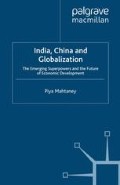Abstract
1991 was the beginning of a new phase for India, a profound one from the standpoint of changing prevalent attitudes towards, and in the realm of, the commercial establishment. In no uncertain terms, economic imperatives could not be shackled by the confines of a mildly socialist framework and regimented government control. India’s partially closed markets had to be opened to the external economy. This meant that competitiveness would be at the centre-stage of business and economic priorities and it was the ability, or the lack of it, that would determine the survival of most enterprises in the ambit of manufacturing and services.
On the eve of India’s independence in August 1947, Jawaharlal Nehru, post-independence India’s first prime minister, spoke of the country’s tryst with destiny… Over five decades later, India has a tryst with globalization. This country is a superpower waiting to happen. The odds are stacked in her favour, the challenge is to ensure that this is the case for a long time to come.
Access this chapter
Tax calculation will be finalised at checkout
Purchases are for personal use only
Preview
Unable to display preview. Download preview PDF.
Bibliography
Asian Development Bank (2004) Asian Development Outlook, Manila, Philippines.
Asian Development Bank (2005) India Economic Bulletin, January, Manila, Philippines.
AT Kearney (2005) News release, 7 December, Washington, DC.
Fischer, Stanley (2002) Breaking out of the Third World: India’s Economic Imperative, International Monetary Fund, Washington, DC.
Government of India (2002) Report of the Steering Group on Foreign Direct Investment, Planning Commission, New Delhi, August.
Kelkar, Vijay (2004) ‘India on the Growth Turnpike’, Australian National University.
Kohli, Atul (2006) ‘Politics of Economic Growth in India: Part 1 The Eighties’, Economic and Political Weekly, Mumbai.
Kohli, Atul (2006) ‘Politics of Economic Growth in India: 1980–2005 Part 2 The Nineties and Beyond’, Economic and Political Weekly, 8 April, Mumbai.
Nayyar, Deepak (2006) ‘Economic Growth in Independent India’, Economic and Political Weekly, 15 April, Mumbai.
Mohan, Rakesh (Deputy Governor of the Reserve Bank of India) (2005) ‘The Indian Economy in the Global Setting’, Address at the Indian Merchants’ Chamber, 17 October Mumbai.
Rodrik, Dani and Subramanian, Arvind (2004) From Hindu Growth to Productivity Surge: The Mystery of the Indian Growth Transition, International Monetary Fund, Washington, DC, May.
UNCTAD (2004) ‘The Shift Towards Services’, World Investment Report, New York and Geneva.
Copyright information
© 2007 Piya Mahtaney
About this chapter
Cite this chapter
Mahtaney, P. (2007). India: Her Tryst with Globalization. In: India, China and Globalization. Palgrave Macmillan, London. https://doi.org/10.1057/9780230591547_4
Download citation
DOI: https://doi.org/10.1057/9780230591547_4
Publisher Name: Palgrave Macmillan, London
Print ISBN: 978-1-349-35272-2
Online ISBN: 978-0-230-59154-7
eBook Packages: Palgrave Economics & Finance CollectionEconomics and Finance (R0)

